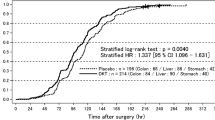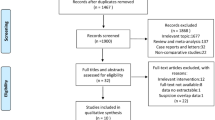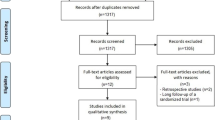Abstract
Purpose
Daikenchuto is an herbal medicine widely used in Japan without clear evidence to prevent bowel obstruction after abdominal surgery. We evaluated the efficacy of Daikenchuto in laparoscopic surgery for colorectal cancer (CRC).
Methods
We included patients from the medical claims databases diagnosed with CRC between January 2012 and December 2019 and treated with laparoscopic surgery. We compared the Daikenchuto and control groups to evaluate early bowel obstruction (EBO) events for 1 year. The Daikenchuto group included patients prescribed Daikenchuto on postoperative day (POD) 0 or 1. An EBO event was defined as the use of a nasogastric tube, transnasal ileus tube, endoscopic balloon dilatation, or the requirement of reoperation for bowel obstruction from PODs 1 to 364.
Results
In total, 46,458 patients met the eligibility criteria; 2407 and 44,051 patients were included in the Daikenchuto and control groups, respectively. Some of the patient’s characteristics were significantly different between the groups. The frequencies of EBO events in the Daikenchuto and control groups were 5.7% (95% confidence interval: 4.8–6.7) and 4.6% (4.4–4.8), respectively. The most frequent events were nasogastric tube (3.1%, 2.9%) and transnasal ileus tube insertions (1.4%, 0.8%) in the Daikenchuto and control groups, respectively. The hospital stay was significantly shorter in the Daikenchuto group than in the control; this trend was confirmed in the sensitivity analysis.
Conclusions
Daikenchuto did not demonstrate efficacy for EBO. It might be adequate for shortening patient’s hospital stay. Further studies are warranted.

Similar content being viewed by others
Data availability
Not applicable.
Code availability
Not applicable.
References
ten Broek RPG, Issa Y, van Santbrink EJP et al (2013) Burden of adhesions in abdominal and pelvic surgery: systematic review and met-analysis. BMJ 347:f5588. https://doi.org/10.1136/bmj.f5588
Ellis H, Moran BJ, Thompson JN et al (1999) Adhesion-related hospital readmissions after abdominal and pelvic surgery: a retrospective cohort study. Lancet 353:1476–1480. https://doi.org/10.1016/S0140-6736(98)09337-4
Dijkstra FR, Nieuwenhuijzen M, Reijnen MM, van Goor H (2000) Recent clinical developments in pathophysiology, epidemiology, diagnosis and treatment of intra-abdominal adhesions. Scand J Gastroenterol Suppl 52–59
Tang L, Zhao P, Kong D (2018) The risk factors for benign small bowel obstruction following curative resection in patients with rectal cancer. World J Surg Oncol 16:212. https://doi.org/10.1186/s12957-018-1510-7
Eto K, Kosuge M, Ohkuma M et al (2018) Defunctioning ileostomy is a key risk factor for small bowel obstruction after colorectal cancer resection. Anticancer Res 38:1789–1795. https://doi.org/10.21873/anticanres.12417
Kono T, Kanematsu T, Kitajima M (2009) Exodus of Kampo, traditional Japanese medicine, from the complementary and alternative medicines: is it time yet? Surgery 146:837–840. https://doi.org/10.1016/j.surg.2009.06.012
Ten Broek RPG, Stommel MWJ, Strik C et al (2014) Benefits and harms of adhesion barriers for abdominal surgery: a systematic review and meta-analysis. Lancet 383:48–59. https://doi.org/10.1016/S0140-6736(13)61687-6
Itoh T, Yamakawa J, Mai M et al (2002) The effect of the herbal medicine dai-kenchu-to on post-operative ileus. J Int Med Res 30:428–432. https://doi.org/10.1177/147323000203000410
Hosaka M, Arai I, Ishiura Y et al (2019) Efficacy of daikenchuto, a traditional Japanese Kampo medicine, for post-operative intestinal dysfunction in patients with gastrointestinal cancers: meta-analysis. Int J Clin Oncol 24:1385–1396. https://doi.org/10.1007/s10147-019-01502-1
Scott FI, Vajravelu RK, Mamtani R et al (2021) Association between statin use at the time of intra-abdominal surgery and post-operative adhesion-related complications and small-bowel obstruction. JAMA Netw Open 4:e2036315. https://doi.org/10.1001/jamanetworkopen.2020.36315
Satoh K, Hashimoto K, Hayakawa T et al (2001) Mechanism of atropine-resistant contraction induced by Dai-kenchu-to in guinea pig ileum. Jpn J Pharmacol 86:32–37. https://doi.org/10.1254/jjp.86.32
Kono T, Omiya Y, Hira Y et al (2011) Daikenchuto (TU-100) ameliorates colon microvascular dysfunction via endogenous adrenomedullin in Crohn’s disease rat model. J Gastroenterol 46:1187–1196. https://doi.org/10.1007/s00535-011-0438-2
Kono T, Kaneko A, Hira Y et al (2010) Anti-colitis and -adhesion effects of daikenchuto via endogenous adrenomedullin enhancement in Crohn’s disease mouse model. J Crohns Colitis 4:161–170. https://doi.org/10.1016/j.crohns.2009.09.006
Kono T, Kaneko A, Omiya Y et al (2013) Epithelial transient receptor potential ankyrin 1 (TRPA1)-dependent adrenomedullin upregulates blood flow in rat small intestine. Am J Physiol Gastrointest Liver Physiol 304:G428–G436. https://doi.org/10.1152/ajpgi.00356.2012
Tokita Y, Yamamoto M, Satoh K et al (2011) Possible involvement of the transient receptor potential vanilloid type 1 channel in post-operative adhesive obstruction and its prevention by a kampo (traditional Japanese) medicine, daikenchuto. J Pharmacol Sci 115:75–83. https://doi.org/10.1254/jphs.10226fp
Yoshikawa K, Shimada M, Nishioka M et al (2012) The effects of the Kampo medicine (Japanese herbal medicine) “Daikenchuto” on the surgical inflammatory response following laparoscopic colorectal resection. Surg Today 42:646–651. https://doi.org/10.1007/s00595-011-0094-4
Yaegashi M, Otsuka K, Itabashi T et al (2014) Daikenchuto stimulates colonic motility after laparoscopic-assisted colectomy. Hepatogastroenterology 61:85–89
Endo S, Nishida T, Nishikawa K et al (2006) Dai-kenchu-to, a Chinese herbal medicine, improves stasis of patients with total gastrectomy and jejunal pouch interposition. Am J Surg 192:9–13. https://doi.org/10.1016/j.amjsurg.2006.01.022
Akamaru Y, Takahashi T, Nishida T et al (2015) Effects of daikenchuto, a Japanese herb, on intestinal motility after total gastrectomy: a prospective randomized trial. J Gastrointest Surg 19:467–472. https://doi.org/10.1007/s11605-014-2730-y
Katsuno H, Maeda K, Kaiho T et al (2015) Clinical efficacy of Daikenchuto for gastrointestinal dysfunction following colon surgery: a randomized, double-blind, multicenter, placebo-controlled study (JFMC39-0902). Jpn J Clin Oncol 45:650–656. https://doi.org/10.1093/jjco/hyv056
Yamamoto S, Inomata M, Katayama H et al (2014) Short-term surgical outcomes from a randomized controlled trial to evaluate laparoscopic and open D3 dissection for stage II/III colon cancer: Japan Clinical Oncology Group Study JCOG 0404: Japan clinical oncology group study JCOG 0404. Ann Surg 260:23–30. https://doi.org/10.1097/SLA.0000000000000499
Manabe N, Camilleri M, Rao A et al (2010) Effect of daikenchuto (TU-100) on gastrointestinal and colonic transit in humans. Am J Physiol Gastrointest Liver Physiol 298:G970–G975. https://doi.org/10.1152/ajpgi.00043.2010
Nakashima M, Takeuchi M, Kawakami K (2020) Effectiveness and safety of regorafenib vs. trifluridine/tipiracil in unresectable colorectal cancer: a retrospective cohort study. Clin Colorectal Cancer 19:e208–e225. https://doi.org/10.1016/j.clcc.2020.05.003
Mizuno K, Takeuchi M, Kanazawa Y et al (2019) Recurrent laryngeal nerve paralysis after thyroid cancer surgery and intraoperative nerve monitoring: nerve monitoring during thyroid surgery. Laryngoscope 129:1954–1960. https://doi.org/10.1002/lary.27698
Seo GH, Choe EK, Park KJ, Chai YJ (2018) Incidence of adhesive bowel obstruction after colon cancer surgery and its risk factors: a nationwide claim study. Ann Surg 268:114–119. https://doi.org/10.1097/sla.0000000000002270
Austin PC (2009) Balance diagnostics for comparing the distribution of baseline covariates between treatment groups in propensity-score matched samples. Stat Med 28:3083–3107. https://doi.org/10.1002/sim.3697
Nakamura Y, Matsuda K, Yokoyama S et al (2021) Intraoperative maneuvers may affect the development of early post-operative small bowel obstruction after laparoscopic colorectal cancer surgery: multicenter prospective cohort study. Int J Surg 86:52–56. https://doi.org/10.1016/j.ijsu.2021.01.007
Menzies D, Ellis H (1990) Intestinal obstruction from adhesions–how big is the problem? Ann R Coll Surg Engl 72:60–63
Yasunaga H, Miyata H, Horiguchi H et al (2011) Effect of the Japanese herbal kampo medicine dai-kenchu-to on post-operative adhesive small bowel obstruction requiring long-tube decompression: a propensity score analysis. Evid Based Complement Alternat Med 2011:264289. https://doi.org/10.1155/2011/264289
Tokita Y, Yuzurihara M, Sakaguchi M et al (2007) The pharmacological effects of Daikenchuto, a traditional herbal medicine, on delayed gastrointestinal transit in rat post-operative ileus. J Pharmacol Sci 104:303–310. https://doi.org/10.1254/jphs.fp0070831
Kainuma M (2016) Kampo diagnosis based on sho. In: Inui A (ed) Herbal medicines. Methods in pharmacology and toxicology. Humana Press, New York. https://doi.org/10.1007/978-1-4939-4002-8_2
Hirayama A, Tomita T, Nishida T, Nagano Y (2022) Live-imaging analysis of target vessels and nitric oxide production associated with gosha-jinki-Gan and Keishi-bukuryo-Gan: two herbal preparations with clinically proven blood flow-improving effects but with different traditional clinical indicative patterns. Evid Based Complement Alternat Med 2022:3821345. https://doi.org/10.1155/2022/3821345
Acknowledgements
We would like to thank Editage (www.editage.com) for English language editing. Taiho Pharmaceutical Co., Ltd. took no part in this study.
Author information
Authors and Affiliations
Contributions
Y. K. contributed to the study conception and all authors contributed to the development and improvement of the protocol and study design. Y. K. performed data analysis. The first draft of the manuscript was written by Y. K., and all authors read, revised on previous versions of the manuscript, and approved the final manuscript.
Corresponding author
Ethics declarations
Ethics approval
This study was approved by the Ethics Committee of the Graduate School and Faculty of Medicine, Kyoto University (approval number: R3038; date: July 1, 2021). This study was performed in accordance with the ethical guidelines for medical and health research involving human subjects by the Ministry of Health, Labor, and Welfare.
Consent to participate
The need for informed consent was waived because anonymized data were used.
Consent for publication
Not applicable.
Conflict of interests
Y. K. is a company employee of Taiho Pharmaceutical Co., Ltd. M. T. received a consultation fee from Eisai Co., Ltd. K. K. received consultation fees from LEBER, Inc., JMDC Inc., Shin Nippon Biomedical Laboratories, Ltd., and Advanced Medical Care Inc.; executive compensation from Cancer Intelligence Care Systems, Inc.; honoraria from Mitsubishi Chemical Holdings Corporation, Mitsubishi Corporation, Pharma Business Academy, and Toppan Inc.; research funds from Eisai Co., Ltd., Kyowa Kirin Co., Ltd., Sumitomo Pharma Co., Ltd., Mitsubishi Corporation., and Real World Data, Co., Ltd.; and held stock in Real World Data, Co., Ltd. The other authors have no direct or indirect conflicts of interest.
Additional information
Publisher's note
Springer Nature remains neutral with regard to jurisdictional claims in published maps and institutional affiliations.
Supplementary information
Below is the link to the electronic supplementary material.
Rights and permissions
Springer Nature or its licensor (e.g. a society or other partner) holds exclusive rights to this article under a publishing agreement with the author(s) or other rightsholder(s); author self-archiving of the accepted manuscript version of this article is solely governed by the terms of such publishing agreement and applicable law.
About this article
Cite this article
Kunitomi, Y., Nakashima, M., Takeuchi, M. et al. Efficacy of Daikenchuto in the prevention of bowel obstruction in patients with colorectal cancer undergoing laparoscopic surgery: An observational study using a Japanese administrative claims database. Support Care Cancer 31, 133 (2023). https://doi.org/10.1007/s00520-023-07599-5
Received:
Accepted:
Published:
DOI: https://doi.org/10.1007/s00520-023-07599-5




